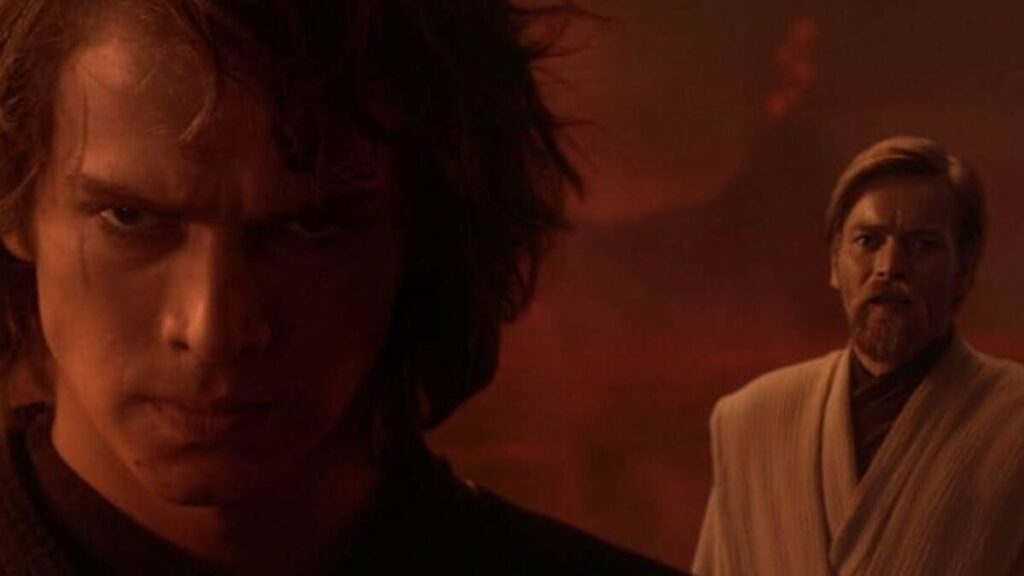When it came to penning the novelization of Star Wars Episode III: Revenge of the Sith, the planning all came before the aftermath of the film’s eventual polarizing release. And by chance, Matthew Stover’s version of the events of the film ended up being one of the saving graces of George Lucas’ closing chapter in his saga, at least to the old guard of fanboys. We all know that the generation who grew up on it and the animated shows ended up being more embracing of the maker’s final contributions to the Star Wars universe.
In an exclusive with Entertainment Weekly, Stover shared his new author’s note, now added to the book’s 20th anniversary re-release. In it he discusses his unique approach to writing the film as a novel with George’s Lucas’ blessing and inspiration from Greek myths.
What sets the book apart from the film is that it allowed Stover to expand on Anakin’s perspective during his fall from the light side. And it’s something that made him nervous from the start. “It had come to me during the panic attack I’d suffered after signing the contract to write this novelization, which had ignited because I’d foolishly committed to write the keystone in the arch of the Skywalker saga for the biggest audience of my career—and the entire Star Wars-loving universe would be hoping for a thrilling space opera, despite the plain fact that every main plot point had been spoiled for decades.”
Stover continued, “Add the challenge of writing a novelization without ever seeing the final movie, because the movie wasn’t done and wouldn’t be out before the book went to the printer. I would be armed with only the script and the collective Lucasfilm knowledge of Star Wars. What saved me then was my early training,” he explained, describing how the guardrails of classic theater mythology came in handy for the writer.
“More than 20 years before I signed that contract, I’d had the good fortune to study theater history under a professor who was an authority on ancient Greek drama. Every single one of the great Greek tragedians had faced exactly my trouble—their audience knew the story going in—and they had some tricks they would pull to make their plays dramatic anyway. I figured I could steal a couple of these for this book.”
“The more I thought about Greek tragedy, the better it seemed to fit. The classical tragedies were drawn from Greek mythology and legend, right? Also—if I needed any further excuse—ancient Greek tragedies were traditionally performed as single acts without intermissions, like modern movies, and they were usually presented in actual, no kidding, wait for it . . . trilogies.”
“I hoped to present the story explicitly as a tragic myth, with language and style more formalized and darker in tone than people generally expect from Star Wars fiction. After all, I intended to argue that this story is special. It’s different from any other Star Wars story—not only because it’s the final film (or so we thought at the time), but because this story is the true foundation that underlies all the rest, and it should feel different from the very first page.”
Additionally, his approach would be informed by how myth served as a template for so much Star Wars media to begin with within its Expanded Universe (before getting decanonized). “But evoking the Greek tragedies was only part of my idea, and I expected that part to be an easy lift, for the reasons I sketched above. The rest, however, was gnawing holes in my stomach lining, because I wanted to fold in elements of the larger Star Wars Expanded Universe (EU).”
“I desperately needed EU material to make this story work. Not because the EU had been part of my life ever since Splinter of the Mind’s Eye, and definitely not because it’d be extremely cool to incorporate elements of those stories into this novelization … I genuinely believed that I needed the EU to make this story work as a novel. It would give the story heft and texture. It would let me touch on where these people come from and where most of them are going to end up, and it would let me weave this specific narrative and its implications into the wider ‘historical’ context of the whole galaxy far, far away.”
The best anecdote of the note was how all of this work, how he’d gone out of his way to plan and pitch to George Lucas, was met with a surprising answer when he asked the living legend how much he should stick to the script. Lucas liberated him from perceiving the movie script as a constraint. “Don’t worry about that stuff. As long as you don’t violate the story, do whatever you want,” Lucas said to Stover. “Just make it good.”
Want more io9 news? Check out when to expect the latest Marvel, Star Wars, and Star Trek releases, what’s next for the DC Universe on film and TV, and everything you need to know about the future of Doctor Who.

